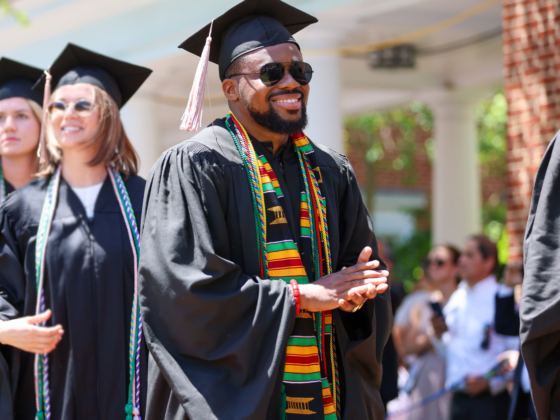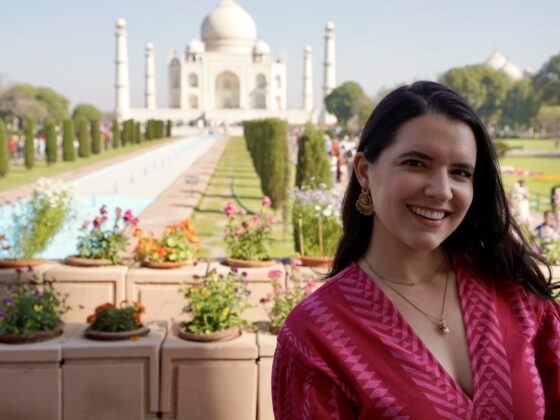David Cleary (EMBA Class of ‘25) is an HR Business Partner at Gartner, where he supports Research and Advisory leaders in their mission to continuously improve the associate experience, increase employee engagement, and reduce regretted attrition.
Eventually, with his Darden MBA, Cleary plans to pursue certification as an Executive Leadership Coach and strike out on his own to start a solo coaching practice. Outside of corporate work, Cleary loves coaching youth sports (most recently 6th and 7th grade lacrosse in Bethesda, MD) and is excited to return after school.
David completed a week-long Global Residency in Australia this June and offered some insight into his experience:
1) Can you describe the trajectory of your career and how your experiences have shaped your current professional focus?
I’ve had what I like to refer to as a “portfolio” career, where I’ve benefited from being able to learn what I like and don’t like across a number of functional roles and entirely different careers. Early on, I made the pivot from my background in psychological research to my first corporate roles in a few startups. This work ranged from recruiting, sales, and even some HR generalist responsibilities. It’s been really exciting seeing my career start to come full circle as I return to pursuing a path in HR. During a brief “sabbatical” from corporate life I even taught elementary school for three years.
2) Why Australia for your Global Residency?
I was initially torn about going to Australia as it was one of the only available countries I’d been to previously (one of my dad’s three sisters moved there “for a year” when she was about 25, ended up meeting an Australian, got married, and raised my three cousins there). However, after speaking to a few members of the class of 2024 who shared how incredible the course was, noting specifically how much it benefitted from the personal touch added by Shane Dikolli — our faculty leader and a native Australian — I was convinced it would be worth going back.
3) Tell us about your fundraising campaign for the Clontarf Foundation. What drew you to this organization, and what was it like to be able to visit them in person?
Learning about and visiting the Clontarf Foundation was the most memorable and personally impactful experience from my Australia GR. The Clontarf Foundation is a not-for-profit that “exists to improve the education, discipline, life skills, self-esteem, and employment prospects of young Aboriginal and Torres Strait Islander men and by doing so equips them to participate more meaningfully in society.”
As someone who has volunteered as a youth sports coach and mentor for over 10 years, I felt a strong connection to Clontarf’s mission and approach of using the power of sports to teach essential life skills to young men.
While at one of the Clontarf school sites, we got to hear directly from the boys and adults who work for Clontarf (including the Foundation’s CEO) and the school. Later in the day, we were also fortunate enough to hear from some Clontarf alumni. I was deeply impressed by the candor with which these boys described the personal traumas of growing up without parents, or with abusive parents, or with parents who struggled with mental health difficulties including drug and alcohol addiction. These stories served to underscore the potential of a program like Clontarf to interrupt the pattern of young people lacking positive role models, and specifically positive male role models, at critical development phases in their lives.
Along with many of my classmates, I was surprised to learn that Australia does not have a college sports scholarship infrastructure like the NCAA and, therefore, college tuition makes attending college cost-prohibitive for most of the Clontarf graduates. Additionally, there seemed to be greater cultural acceptance more broadly in the country of hiring non-college graduates into traditional “office” jobs. We also heard a positive outlook on the promise (from a socio-economic perspective) of pursuing work in the trades or other manual labor, such as mining.
I would love to see U.S. culture embrace this last point and broaden its somewhat narrow focus on a college education as the primary path towards a fulfilling and lucrative career for the majority of Americans.
Prior to our GR, one of the EMBA ‘24s shared that they were similarly inspired by Clontarf and had therefore collected some donations to help fund new “footy” (Australian Rules Football) uniforms for the boys. We had a similar experience and were excited to continue this tradition.

4) How did your time in Australia influence your understanding of global business practices? What are some key differences you noticed between the business culture in Australia and the U.S.?
Our visit with one of Shane’s former students, Simon Moore-Crouch, a native Australian who came to the U.S. for his MBA and then began working at a then small startup (Teamworks), provided an illuminating case study on global business practices as well as cultural differences between Australia and the U.S.
Simon candidly discussed how certain cultural traditions from the early days of Teamworks, such as the use of “war cries” meant to pump up the team, didn’t resonate nearly as well with an Australian division which was never fully incorporated post-acquisition into the cultural fabric of the firm.
Startups, particularly U.S. tech startups full of many young employees, have a reputation for claiming that success relies on long hours and foregone vacations. However, there was a clear sense across our business visits, especially in the discussion of the Australian employees at Teamworks, that PTO is a key form of compensation, and most employees expect to take all of it and many employers openly accept this.
In the end, very few employees from the acquired division remained with the company. This anecdote underscored a key lesson for any global leader: growth often requires acquisitions, and the success of an acquisition, especially one involving employees living in a different country than the headquarters, is dependent not just on the integration of operations and products, but perhaps even more so on the integration of different cultures.
5) In what ways did taking your studies abroad enhance your MBA program?
After meeting with two impressive former oil-industry HR executives-turned-HR-consultant entrepreneurs, several of my classmates and I chose to “agree to disagree” on whether our Darden MBA program formally includes any “HR classes.” Many of the lessons in our LO/LR classes certainly dovetail with the responsibilities of HR executives; however, we do not have a class called “HR for managers.”
Semantics aside, as an HR professional and one who hopes to one day start my own executive leadership and coaching business, I could not have asked for a better session to help me think through the daunting question of when is the “right time” to leave a relatively safe and structured path within a large corporate HR department to start out on my own.
While their advice felt personally tailored to my question, it applies just as well to any Darden student with entrepreneurial ambitions. These entrepreneurs directly confirmed that there will never be a “perfect” or even “right” time to do it, but that certain personal factors could influence this (e.g., financial stability, family responsibilities, etc.).
Furthermore, they shared some wonderful insight on a common question of how much time to spend up front crafting a business plan, writing a mission statement, and building out the other formalities of their business prior to taking on projects. In short, they described this type of work as tangential to the core of any business — serving clients —and really just a form of procrastination.
Instead, they strongly encouraged anyone considering a similar path to just jump in and focus on winning client contracts and then excel in the delivery of results. From there, they indicated that they could refine their areas of focus and strategic direction over time, but that if they didn’t test their ability to win clients and deliver value for those clients, all the rest would be wasted effort.
6) What advice would you give to other students considering participating in a Global Course in Australia?
To start, I would highly encourage students to go to Australia for a GR, even if they’ve been to some parts of Australia before, and especially if the course includes time in Perth, WA. I was deeply grateful for the opportunity to see a different part of Australia which, while having shared elements of broader Australian culture, also provided a nice juxtaposition to Sydney (as well as Melbourne, which I had previously visited on my own).
I would also encourage students to be really thoughtful about the questions they ask the generous hosts who have gone out of their way to craft meaningful learning experiences for us and chosen to spend some of their precious time answering our questions.
Early in the GR, I wondered whether it could be considered rude to ask these business executives about hot-button or sensitive issues. I discussed this with Shane, who shared that except for one particularly contentious issue (which at the time of a previous trip had actively been the subject of a legal inquiry) pretty much any topic was considered “fair game” for these open Q&A sessions.
While there may be a natural temptation to pose a question that demonstrates some amount of understanding (and researching before the visits is definitely valuable), I’d urge students to instead pose questions revealing how much they’re willing to learn and potentially form new opinions. In particular, several leaders alluded to rare but favorite questions that take the form of “What are some nuances to X, Y, or Z situation or decision you made that outsiders might not fully grasp from just hearing about it in the news?”





